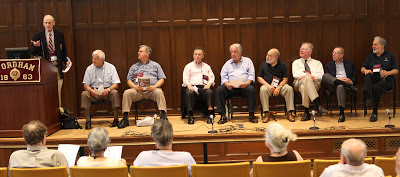
A hard-boiled military man talked music. A veteran sportscaster talked theater. And a pioneering M.D. talked literature. Any attempt to typecast the guys from the Class of 1963 would fall short, as was revealed in a panel discussion held during Jubilee 2013.
Central casting would be hard pressed to find someone who looks more like a military man than Larry Daly, FCRH ’63, or a more like a sportscaster than Sal Marchiano, FCRH ’63. But their conversation betrayed career stereotypes and revealed an intellectual depth that they both said was fostered through a liberal arts education received at Fordham.
Daly recalled how Robert Remini, Ph.D., sparked his interest in history and opera, Glee Club director James B. Welsh nurtured his love of music, and Sabine Gova, Ph.D., showed him “how art reflected and enriched our lives.”
“When I was stationed overseas, I went into every museum and every cathedral and took every opportunity to apply what Madame Gova gave us on a daily basis,” he said.
The panel made a strong case for the humanities, when most educational institutions are being pressured to show a return on investment and raise test scores.
“We’re in a time where thought is in danger,” said John Sexton, Ph.D., FCRH ’63, GSAS ’65, ’78, president of New York University. “The measurers are coming to higher education.”
Sexton, whose GPA at Fordham College Rose Hill was 2.1, compared the global study that gauges student achievement for 15-year-olds, known as PISA, to that of baseball’s fielding percentage.
“It doesn’t measure if you get the ball, or try to get the ball, it doesn’t measure any of that stuff that can make a difference in the ball game,” he said. “Because of the way I studied here at Fordham, I learned most from my peers. You can’t measure that.”
Doing work that can’t be measured would be anathema to “the measurers,” but it was part of the culture at Fordham in 1963, as was revealed in an anecdote told by Ralph Lopez, M.D., FCRH ’63. Lopez recalled when Timothy S. Healy, S.J., took him aside one day and told him he should read Faulkner. Lopez asked which book, to which Healy responded, simply, “Faulkner.” Lopez got the picture. Healy meant all of Faulkner.
“There’s only one problem,” Lopez recalled Healy saying. “You don’t get credit and don’t tell anybody.”
If the knowing nods from the other panelist were any indication, it was not an uncommon story. Indeed, Sexton said that just before he graduated, it was Healy who stopped him in the quadrangle and told him that the faculty was disappointed with his performance, but that they were willing to give him a second chance by enrolling him in the Ph.D. program for religion.
Marchiano said he no idea about the education he was about to get at Fordham; to his mind, he was going to the “University of WFUV.” Eventually, he said, integral aspects of the school’s liberal arts philosophy began to rub off on him. In particular, he said his classes in ethics informed his career–including his current views on the sports industry.
“What has bothered me over the past few decades was that economic expansion of the industry has led to a dilution of talent, exorbitant ticket pricing, ridiculous salaries to the player, and, to me, the sports fan has been abused,” he said. “Sports are still wonderful if you play hoops with your son or your grandson in the driveway.”
Pressed on his thoughts about “big time” commercial sports, he said Harold Arlen’s Broadway tune “It’s Only a Paper Moon,” summed up it up quite well.
“It’s a Barnum and Bailey world / Just as phony as it can be,” he said.
